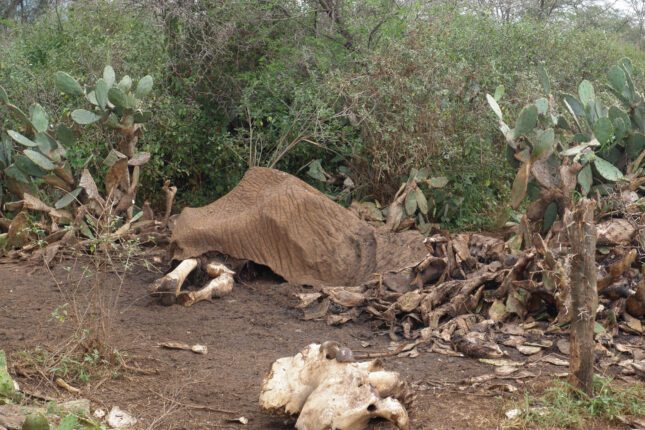-
ECSP Weekly Watch | January 6 – 10
›
A window into what we’re reading at the Wilson Center’s Environmental Change and Security Program
Room for Justice in Vietnam’s Energy Transition? (The Diplomat)
Vietnam’s crackdown on environmental leaders such as Hoàng Thị Minh Hồng on disputed charges raises significant concerns about human rights, transparency, and civil society’s role in its energy transition. These arrests have garnered international attention, but Vietnam’s government argues that they had nothing to do with environmental work. And while Hoàng and other activists have been released, their work remains curtailed. The message is clear: you’re not welcome here.
-
ECSP Weekly Watch | December 16 – 20
›
A window into what we’re reading at the Wilson Center’s Environmental Change and Security Program
Humanitarians Highlight the Climate-Conflict Nexus (The New Humanitarian)
Climate change’s disproportionate impacts on vulnerable populations exacerbate socioeconomic inequalities and conflict, particularly during natural disasters. This vexed connection has led humanitarians and peacebuilders increasingly to address climate and conflict challenges together in order to provide integrated relief, recovery, and aid.
-
ECSP Weekly Watch | December 9 – 13
›
A window into what we’re reading at the Wilson Center’s Environmental Change and Security Program
Mekong River Development Faces Public Outcry (Mongabay)
The Mekong River flows through China, Myanmar, Laos, Thailand, Cambodia, and Vietnam—and a new development on this waterway near the downstream Thailand-Laos border has triggered protests in Thailand. The Pak Beng hydropower development is a joint project of China Datang Overseas Investment and Thailand-based Gulf Energy Development which is estimated to generate 912 megawatts of power to be sold to Thailand’s state energy company.
-
ECSP Weekly Watch | December 2 – 6
›
A window into what we’re reading at the Wilson Center’s Environmental Change and Security Program
Famine Prevention Systems Prove Insufficient (Reuters)
The Integrated Food Security Phase Classification (or IPC) is a global partnership that monitors hunger levels. It is widely recognized for its five-phase classification system of food insecurity that ranges from “minimal” (Phase 1) to “famine” (Phase 5). While the IPC’s aim is to inform humanitarian organizations at an early stage of a crisis to allow them streamline the flow of aid, the worsening global hunger levels experienced this year have pointed to shortcomings in existing prevention systems.
-
The 2024 Montreal Climate Security Summit: Four Takeaways
›
“I think we need to approach climate security completely differently,” said Sharon Burke, Founder and President of Ecospherics and Wilson Center Global Fellow, at the recent 2024 Montreal Climate Security Summit. “It’s not just that climate change is an opportunity cost in combat power, or that it’s effecting our bases and operating environment, or that it is an accelerant to instability. It is itself the threat.”
-
ECSP Weekly Watch | November 18 – 22
›
A window into what we’re reading at the Wilson Center’s Environmental Change and Security Program
Over 40,000 Protest for Maori Rights in New Zealand (Al Jazeera)
Earlier this month, the libertarian ACT New Zealand party introduced the Treaty Principles Bill in that nation’s legislature. The controversial measure seeks to reinterpret the 1840 Treaty of Waitangi—a foundational document that granted Maori tribes broad land rights in return for ceding governance to the British. The treaty’s historical value remains significant to this day, and it is a contemporary reminder of the colonial injustices faced by the country’s native tribes.
-
Addressing Human-Wildlife Conflict in Ethiopia’s Protected Lands
›
We are undoubtedly at the 11th hour for biodiversity. The World Wildlife Foundation recently reported that Earth saw a 70% drop in species populations over the last fifty years.
As global leaders convened at COP16 in Cali, Colombia in late October and early November, many of the most pressing threats to biodiversity and pathways to improving governance effectiveness were on the agenda. This year’s conference theme—“Peace with Nature”—offered an impetus for a deeper dialogue on the conflict-biodiversity nexus, which included the work of “Peace@CBD”: a community of NGOs, institutions, and individuals that promotes relationships between nature, peace, and conflict.
-
ECSP Weekly Watch | November 12 – 15
›
A window into what we’re reading at the Wilson Center’s Environmental Change and Security Program
Shell Wins Appeal to Overturn Landmark Emissions Ruling (Al Jazeera)
Three years ago, a court in the Netherlands ruled in favor of environmentalists and required energy giant Shell to drastically reduce its greenhouse gas (GHG) emissions. The decision would compel the company to cut the absolute carbon emissions it created in 2019 by 45% by the year 2030—including emissions caused by its products. This ruling was the first of its kind by requiring companies to adhere to the Paris Agreement, and it ignited further attempts by climate activists to take legal measures against other fossil fuel companies.
Showing posts from category Eye On.







